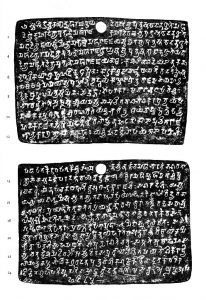
Ôm! Hail! From (the city or hill of) Uchchakalpa;—(There was) the Mahârâja Ôghadêva. His son, who meditated on his feet, (was) the Mahârâja Kumâradêva, begotten on the Mahâdêvî Kumâradêvi. His son, who meditated on his feet, (was) the Mahârâja Jayasvâmin, begotten on the Mahâdêvî Jayasvâminî. His son, who meditated on his feet, (was) the MahârâjaVyâghra, begotten on the Mahâdêvî Râmadêvî.
(Line 4.)—His son, who meditates on his feet, the Mahârâja Jayanâtha,—begotten on the Mahâdêvî Ajjhitadêvî,—being in good health, issues a command to the cultivators, beginning with the Brâhmaṇs, and to the artisans at (the village of) Chhamdâpallikâ in the Nâgadêya santaka:—
(L. 6.)—“Be it known to you that, for the purpose of increasing my own religious merit, this village is granted by me,—with the udranga and the uparikara, (and with the privilege that it is) not to be entered by the irregular or the regular troops, (but) with the exception of (the right to fines imposed on) thieves,— to the Brâhman Mitrasyâmin, of the Kâṇva gôtra and the Vâjasanêya-Mâdhymdina (śâkhâ).
(L. 9.)—“You yourselves shall render to him the offering of the tribute of the customary royalties and taxes, and shall be obedient to (his) commands.
(L. 10.)—“And those kings who shall be born in Our lineage,—by them this grant should not be confiscated, (but) should be assented to; (and) the tribute of the taxes which by custom should not belong to the king, should not be taken.
(L. 12.)—“And whosoever may confiscate this grant,—he shall become invested with (the guilt of) the five great sins and the minor sins.”
(L. 13.)—And it has been said in the Mahâbhârata by the venerable Vyâsa,—“O Yudhishṭhira, best of kings, carefully preserve land that has been given, whether by thyself or by another; (verily) the preservation (of a grant) (is) more meritorious than making a grant! The earth has been enjoyed by many kings, commencing with Sagara; whosoever at any time possesses the earth, to him belongs, at that time, the reward (of this grant that is now made, if he continue it)! As a rule, indeed, no inauspicious condition is experienced by kings; but they are purified for ver, when they bestow land! The giver of land enjoys happiness in heaven for sixty thousand years; (but) the confiscator (of a grant), and he who assents (to an act of confiscation), shall dwell for the same number of years in hell! Fathers (in the world of the dead) clap their hands upon their arms, (and) grandfathers leap (from joy), (saying)—‘A giver of land has been born in our family; he shall become our deliverer’! He who confiscates land, rich in all (kinds of) grains, (that has been granted),—he becomes a worm in the ordure of a dog, and sinks (into hell), together with (his) ancestors!”
(L. 21.)—In a century of years, together with the seventy-fouth (year), on the fourteenth day of the month Âshâḍha,—on this (lunar day), (specified) as above by the day (&c.),—(this charter) has been written by me, the Bhôgika Guñjakîrtti, the grandson of the Bhôgika, the Amâtya Râjyila, and the son of the Bhôgika Dhruvadatta. The Dûtaka (is) the Uparika, Dîkshita, householder, and chief of architects, Śarvadatta.
(L. 24.)—The year 100 (and) 70 (and) 4; (the month) Âshâdḥa; the day 10 (and) 4.